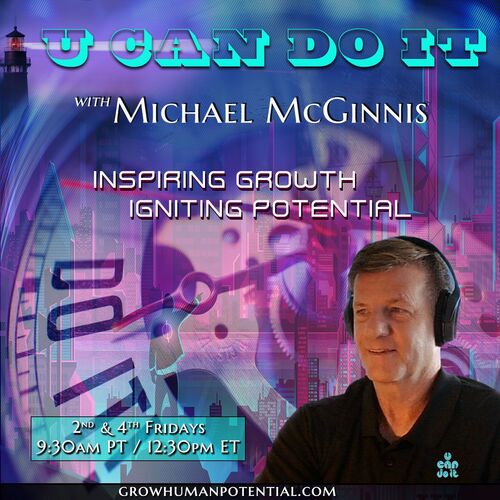
Confronting Our MortalityPart 1: We Are All Going To Die, So Let’s Learn About It
U Can Do It with Michael McGinnis: Inspiring Growth ~ Igniting Potential
Episode · 3 Plays
Episode · 3 Plays · 29:12 · Nov 22, 2024
About
My life's research on the topics of Human Development and Human Potential culminated in the above framework. It has been nationally recognized for its simplicity and providing a structure for those aspiring to become their full potential. The 3 stages of growth are outlined in the above image. This was the topic of my initial podcasts, providing an overview of the stages to becoming our full potential. We initially come to understand our personality and identify those aspects of self that need to be addressed so that we can survive and then thrive with the everyday roles and responsibilities we have in life. This is the 1st stage of "Personal Growth". The 2nd stage, "Self-Discovery", allows us to take that hard look in the mirror to question who we want to be in this life, along with our beliefs and values that we want to stand for. The 3rd stage, for those called to understand the deeper meaning of life and beyond, and how they fit in, is the 3rd stage of growth, "Enlightenment" or "Self-Transcendence". This podcast is a great follow to my recent series on retirement, which is the stage where we more actively confront death and our own mortality. Here we confront our mortality, an essential ingredient to remind ourselves that time is our precious resource that will indeed run out and becomes our motivation to strive to be all we can be. Only a handful out of every hundred or so individuals muster up the courage and drive to enter the 3rd stage of development. However, everyone will enter this stage as we confront the end of our life, our death. This was captured well in Elisabeth Kübler-Ross' book, "Death: The Final Stage of Growth". Unfortunately our societal attitude towards death is largely avoidance, which limits the most amazing growth opportunity for those dying along with their friends and family. According to Psychology Today: "Whether we like it or not one of the only sure fire things in life is that we are all going die. It is one of the subjects that we in the West are discomforted by, embarrassed about and that many of us avoid and this includes avoiding the people who are experiencing grief or who are dying. We don’t talk about death. We talk about sex, drugs and money. We teach our children about these subjects but we don’t talk about death and dying. Death was so common in the 19th century that it was readily addressed. People wore black if they were in mourning and were treated accordingly. If people were dying they planned their funerals with their family and everyone knew to express their condolences if they came across someone who was bereaved. It seems we’ve got out of the habit and the subject has become taboo." https://www.psychologytoday.com/us/blog/handy-hints-for-humans/201703/we-need-to-talk-about-death Is this a key reason that we find so few enlightened individuals here in the US as compared to places like India, where death is not hidden, but instead revered and celebrated? What is the benefit you ask to be talking about death? That we accept it as a part of life and come to understand it so that we can better deal with these times with our loved ones and ultimately our own demise. And with the resources available to us today on this topic, we can find peace, comfort, and even an understanding of death so that we are no longer afraid. This is the ultimate growth we can experience as a part of the Enlightenment stage! I experienced death at a young age when my mother died from cancer when I was only 14. No one helped me to deal with this traumatic ordeal at such a young age. I returned to school only to experience everyone avoiding me. I felt lost and confused. It was an incredibly lonely experience. Years later I was drawn to volunteer opportunities that all shared death in common. I volunteered at a children's oncology camp, as an Emergency Medical Technician on a volunteer ambulance, overseas in areas where mortality rates were very high, and in the most profound experience in all, as a hospice care provider. Another profound opportunity to learn about death came from a close friend being crushed under his truck and pronounced dead on the scene, only to revive once he arrived at the hospital and having a most incredible near-death experience. I began to learn about death from multiple perspectives which healed the pain from my childhood experience and mostly, gave me peace and comfort about death and my own mortality. I wish that everyone could share these experiences and conclusions! Otherwise, our fear of death and our mortality has a profound impact on our life and can hold us back from fully experiencing life and becoming our own full potential. Confronting death can have this profound motivation. In this podcast, I expand on these experiences and what I learned. This will set the stage to begin conversation about death and our mortality from various perspectives to hopefully help you to reconsider death and open yourself to more conversation about the death of others and considering your own mortality!! With love, Michael
29m 12s · Nov 22, 2024
© 2024 Spreaker (OG)